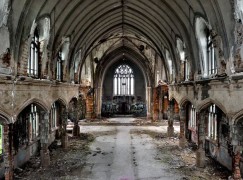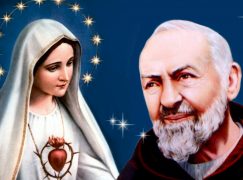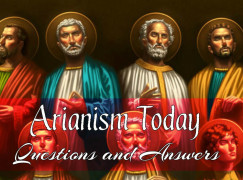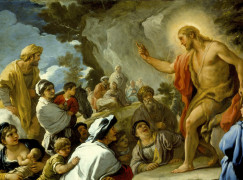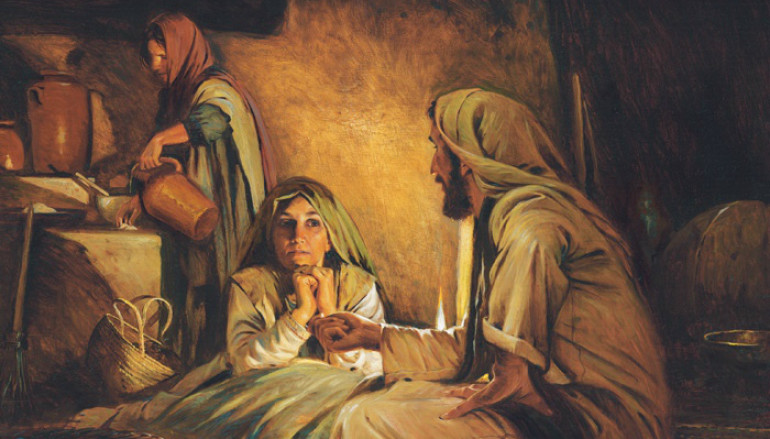

Do We Fear the Divine Encounter?
Pope Benedict XVI said, “The heart open to God, purified by contemplation of God, is stronger than guns and weapons of every kind … the Evil One has power in this world, as we experience continually; he has power because our freedom continually lets itself be led away from God.” The motto of the Evil One is “Non Serviam,” “I will not serve.” Our daily motto must stand in contrast to this; it must be identical to Mary’s: “Serviam!” — “I will serve!”
This brings us to the key to Pope John Paul II’s master plan for the new millennium, as he asks us to set aside our disconnected busy-ness, and to start fresh by contemplating the face of Christ. It is clear that the Holy Father was encouraging us to place our emphasis on reconnecting to the Divine Life of God, which is classically referred to as the unum necessarium, the one thing necessary.
The “one thing necessary” constitutes the essential foundation for the interior life and consists in hearing the word of God and living by it (I will serve!). It stems from the story of Martha and Mary (Lk 10:38-42), where we first see that, amazingly, the Second Person of the Holy Trinity was sitting right in their living room. Now, Martha remains busy with the good and noble protocol of hospitality while Mary sits at the feet of Jesus, her eyes locked on His holy face, peering into His soul, hanging on His every word. Mary is actually in adoration, soaking in everything our Lord wants to give her. I like to say that she is “Mary-nating” — soaking in the gusher of God’s graces. Mary had come to understand what St. Augustine said: “God loves each of us as if there were only one of us.” Remarkable!
When Martha objects to Mary’s lack of activity, Jesus tells Martha that she remains anxious and upset about many things while Mary has chosen the better portion, the “one thing necessary” (unum necessarium). Mary was the one who was making the guest truly feel welcomed while Martha remained detached, going through the motions of the demands of protocol. God is light and love and truth Who brings order and meaning and serenity to our lives. While we remain disconnected from our Source, we remain easily agitated and frustrated in our disordered and chaotic existence as we continue to walk in darkness.
A very significant modern example of this is seen in the Martha-like indifference to the presence of the Divine in so many of our present-day liturgies, compared to a more Mary-like contemplative way of worshiping. Contemplative awe and veneration has always been the distinctive way Catholics worshiped, until recent decades. The unintended consequence of the modern initiative to push for a more irreverent way of worshiping that is performance oriented and man-centered, lacking in a deep sense of the sacredness of God, has led to an epidemic of detachment from the Divine, facilitating the modern prevalence of spiritual sloth (indifference towards spiritual things). Like Martha, God is “right there in our midst,” but we act as though He is not, or if He is, “What’s the big deal?”
Pope Benedict XVI (then Cardinal Ratzinger) stated that any real effort at renewal in the Church must begin with a new liturgical movement:
“I am convinced that the crisis in the Church that we are experiencing today is to a large extent due to the disintegration of the liturgy, which at times has even come to be conceived of etsi Deus non daretur (as though God were not there): in that it is a matter of indifference whether or not God exists and whether or not He speaks to us and hears us. But when the community of faith, the world-wide unity of the Church and her history, and the mystery of the living Christ are no longer visible in the liturgy, where else, then, is the Church to become visible in her spiritual essence? Then the community is celebrating only itself, an activity that is utterly fruitless. And, because the ecclesial community cannot have its origin from itself but emerges as a unity only from the Lord, through faith, such circumstances will inexorably result in a disintegration into sectarian parties of all kinds — partisan opposition within a Church tearing herself apart. This is why we need a new Liturgical Movement, which will call to life the real heritage of the Second Vatican Council.”
For 27 years of my priesthood, as we have tried to restore the liturgy amid vociferous resistance, I have watched and I have often asked myself, “What is behind this widespread rejection of a more solemn and serious and sacred way to worship God?” I have concluded that many fear the “Divine Encounter.” Many know that if we can, like Martha, not make too big of a deal that Jesus (The Blessed Sacrament) is in our house (church), we can just carry on with our everyday lives, keeping Jesus at a “manageable distance.” We know (at least at a spiritual level) that if we ever make that “Divine Encounter,” it is a “game changer.” We know we’ll end up turning our whole heart, mind, soul and strength over to Him. That’s Scary!!! … because I am turning control of my life over to Him. We know He may ask me to do things that challenge me. “No thanks,” we say to ourselves, “let’s keep it casual so I can maintain control. I’ll do a few nice things here and there (Martha), so I don’t appear to be completely disconnected. But, this total abandonment to Him? No sir! Too scary! Too unpredictable!”
This is why I wholeheartedly agree with Cardinal Burke who said …
“The Sacred Liturgy is absolutely the first act of the New Evangelization. Unless we worship God in spirit and in truth, unless we celebrate the Sacred Liturgy with the greatest possible faith in God and faith in the divine action which takes place in Holy Mass, we are not going to have the inspiration and the grace to carry out the New Evangelization […]
If the Sacred Liturgy is celebrated in an anthropocentric way, in a horizontal way in which it is no longer evident that it is a divine action, it simply becomes a social activity that can be relativized along with everything else — it doesn’t have any lasting impact on one’s life.”
Let’s put casual, cafeteria Catholicism in the history books, and be unafraid to make that “Divine Encounter!”
“Take, Lord, and receive all my liberty, my memory, my understanding, and my entire will, all I have and call my own. You have given all to me. To you, Lord, I return it. Everything is yours; do with it what you will. Give me only your love and your grace, that is enough for me.” – Ignatius of Loyola


